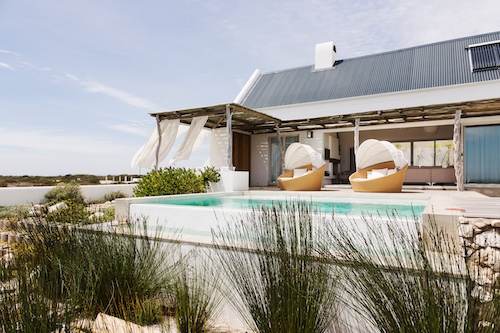Second home vs. investment property: What’s the difference?
Contributed by Sarah Henseler
Nov 12, 2025
•6-minute read

The line between second home and investment property is often blurred. However, knowing the difference can save you thousands of dollars in taxes and financing costs.
Read on to learn what classifies as a second home vs. an investment property, how lenders and the IRS treat them differently, and when to buy which property type.
What is a second home?
A second home is a property you buy in addition to your primary residence that you intend to occupy for part of the year. Typically, it’s a vacation home, but it could be any property you regularly visit but don’t live in full-time.
To finance a second home, you may need a new mortgage. However, many homeowners tap into equity in their first home instead. For example, home equity loans, cash-out refinances, and home equity lines of credit (HELOCs) are all popular second home financing strategies. Rocket Mortgage® does not offer HELOCs at this time.
That said, to be considered a second home by lenders and the IRS, the property typically must be:
- A single-unit home.
- At least 50 miles from your primary residence.
- Used for personal purposes for at least the greater of 14 days or 10% of the days it’s rented at fair market rent per year.
What is an investment property?
An investment property is real estate purchased mainly to generate income or appreciate in value, rather than for personal use. Common examples include apartments, commercial buildings, fix-and-flip projects, and short-term rentals listed on platforms like Airbnb.
Most investors fund investment properties with a mix of debt via investment property loans and equity, such as cash and capital raised from other investors. However, investment properties are financed and taxed differently from properties designated for personal use.
How lenders finance second homes vs. investment properties
Whether you’re buying a second home or an investment property, most lenders look at:
- Your income and savings: Proof of steady income and cash reserves gives lenders more confidence that you can afford loan payments. The higher your income, the better.
- Your credit score: This tells lenders how reliably you’ve repaid debt in the past. Most lenders, including Rocket Mortgage®, require a minimum credit score of 620.
- Your debt-to-income ratio (DTI): This is the share of your income that will go toward paying off debt. The lower your DTI, the more comfortably you can afford the loan.
- Your down payment: This shows that you have skin in the game. The higher your down payment, the less likely you are to walk away from the loan when times get tough.
- Loan type: Mortgages can be conventional or government-backed, fixed- or adjustable-rate, 30-year or 15-year loans, etc. The loan type will influence lending decisions.
- Property type: Real estate can be classified by function, such as second home or investment property. Each type carries its own risks and potential returns.
For second home and investment property purchases, lenders typically have different borrowing requirements:
|
Requirements |
For a second home |
For an investment property |
|
Credit score |
680 if down payment > 25% 640 if down payment ≤ 25% |
680 if down payment > 25% 640 if down payment ≤ 25% |
|
Down payment |
10% |
15% for 1-unit properties 25% for 2 – 4-unit properties |
|
Debt-to-income (DTI) ratio |
≤ 36% |
≤ 36% |
Interest rates can vary wildly
Lenders set mortgage rates based on the cost of funding and servicing the loan, the default risk inherent in extending credit, and the profit margin they want to achieve on their capital. As a result, mortgage rates can be higher or lower, depending on the lender, market, and borrower.
That said, second home loan mortgage rates tend to be up to 0.50% higher than primary home rates, while investment property rates tend to be even higher at 0.50% to 0.75% more than primary home rates (all else equal). This is because lenders consider investment properties slightly riskier than second homes and both property types riskier than primary homes.
Down payment requirements
Loans for second homes and investment properties also differ in their down payment requirements. Typically, you must put down at least 10% for a second home and 15-25% for an investment property, depending on the loan type and number of properties being financed. Again, this is because lenders see investment properties as slightly riskier than second homes.
To determine how much you need for a down payment, work closely with your lender or, for a quick estimate, enter your loan details into a down payment calculator.
How taxes work for investment properties vs. second homes
Second homes and investment properties are taxed differently. Here’s a quick breakdown:
How they are similar
First, here’s where the tax treatment of second homes and investment properties is similar:
- Mortgage interest deduction: Generally deductible for both property types (though different limits may apply).
- Property taxes: Generally deductible for both property types (though different limits may apply).
- Capital gains on sale: Both property types generally subject to capital gains tax when sold (though different exclusions may apply) .
How they differ
Now, here’s where the tax treatment of second homes and investment properties differs:
- Property tax deductions: Generally unlimited for investment properties; for second homes, limited by the state and local tax deduction (SALT), which was recently raised from $10,000 to $40,000.
- Property expenses outside taxes and mortgage interest: These include maintenance, repairs, utilities, property insurance, etc., and are generally deductible for investment properties; for second homes, they’re considered nondeductible personal expenses.
- Rental income: Taxable for investment properties; for second homes, only taxable if the home is rented for more than 14 days per year.
- 1031 exchange: Investment properties exchanged for like-kind properties may defer capital gains tax; second homes don’t qualify for this benefit.
Consult a licensed tax professional to learn more about how the IRS treats second homes and investment properties.
How to decide which property is right for you
When choosing between buying a second home or an investment property, consider your lifestyle and financial goals.
For example, if you want a place for occasional getaways, a second home may be best. However, if you prioritize a high ROI, an investment property could be the better choice.
When making the decision, ask yourself these questions:
- How often will I be staying at the property?
- What are my financial goals for the property?
- How will this property be managed?
FAQ about second homes and investment properties
Here are answers to frequently asked questions regarding second homes and investment properties:
Is a second home considered an investment property by the IRS?
Generally, no. A second home is only considered an investment property by the IRS if you rent it out and your personal use does not exceed 14 days per year or 10% of the total days it’s rented at a fair rental price, whichever is greater.
Can I convert a second home into an investment property?
Possibly. Check with your lender, since lenders typically view second homes and investment properties as carrying different levels of risk, which can affect your loan terms and interest rate.
How do I avoid capital gains on a second home?
If a second home was previously used as your primary residence, you may qualify for a capital gains tax exclusion of up to $250,000 (single filers) or $500,000 (married filing jointly) upon sale. To qualify, you must have owned and lived in the home as your primary residence for at least 2 of the 5 years before the sale.
How many days can you live in an investment property?
You can live in an investment property for up to the greater of 14 days or 10% of the total days it’s rented at a fair rental price. Anything beyond this turns the property into a second home, which offers personal benefits but lowers the property’s economic occupancy.
Please keep in mind that this article is for informational purposes only and is not intended to provide financial, investment, or tax advice. You should consult a qualified financial or tax professional before making decisions regarding your retirement funds or mortgage.
The bottom line: Making the right choice
No doubt, it's a great place to be in a position to buy a second property. When it comes to which is best, it largely hinges on what you're looking for – and what you'd want to use it for.
A second home could be a better fit for you if you prefer another place to nest for at least part of the year, with the possibility of raking in a bit of additional income. An investment property can be a bigger boon to your rental income, and also comes with a separate set of tax obligations and breaks.
Knowing the financial gains and obligations of both can help you figure out your financial goals and sync your choices with your lifestyle needs.
A quick note: This might go without saying, but misrepresenting an investment property as a second home to secure better loan terms is mortgage fraud. As such, it's punishable by hefty fines – one could even be subject to an FBI investigation.
With modern technology, lenders use digital verification tools and random site visits to detect fraud, and unapproved changes in property use can trigger loan acceleration or full repayment.
If you have any questions or need guidance on the legal ins and outs of buying property, consider consulting with a real estate attorney. And if you're ready to buy a home, you can also get in touch with the Home Loan Experts at Rocket Mortgage.
This article is for informational purposes only and is not intended to provide financial, investment, or tax advice. You should consult a qualified financial or tax professional before making decisions regarding your retirement funds or mortgage.

Christian Allred
Christian Allred is a freelance writer whose work focuses on homeownership and real estate investing. Besides Rocket Mortgage, he’s written for brands like PropStream, CRE Daily, Propmodo, PropertyOnion, AIM Group, Vista Point Advisors, and more.
Related resources
6-minute read
How to refinance an investment property
Thinking about refinancing your investment property? Learn about refinancing, why you might benefit, and the steps you must take to get through the process.<...
Read more

7-minute read
Using a HELOC for a down payment on a second home
Want to use a home equity line of credit (HELOC) for the down payment on a second home? Learn about how it works and other options for funding a down payment.
Read more
4-minute read
Understanding owner-occupied properties: What investors should know
Owner-occupied investments are properties in which the landlord both owns and lives in a home. Understand the pros and cons of owner occupancy before you buy...
Read more